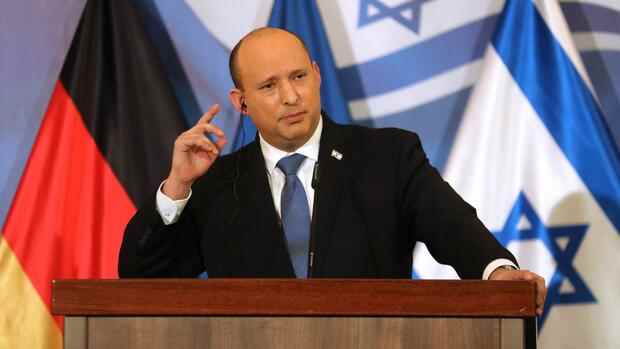Tel Aviv Israel is one of the few countries that has maintained good relations with both Russia and the United States and Ukraine. But this circumstance poses great challenges for Prime Minister Naftali Bennett in times of war.
He must carefully weigh up how he comments on the actions of Kremlin chief Vladimir Putin in Ukraine. On the one hand, Israel could anger its key ally, the US, by not condemning the Russian invasion.
If Bennett does so, he is jeopardizing his good relationship with Moscow. And that is of central importance for Israel, because the country wants to prevent an Iranian presence in its neighboring state of Syria. Russia controls the airspace over Syria and currently allows the Israeli Air Force to strike unhindered against Iranian activities in Syria. For this reason, Bennett has so far held back from criticizing Putin’s invasion.
Michael Herzog, Israel’s ambassador to the US, brought up the issue in a tweet in a nutshell: “While our moral position [zur Ukraine] is clear, we strive to pursue them in a manner that maintains our freedom of operation against Iran in the region.” The Israeli Air Force would not be able to bomb Iranian convoys crossing Syria for weapons without Putin’s consent to deliver to Hezbollah in southern Lebanon.
Top jobs of the day
Find the best jobs now and
be notified by email.
But the Ukraine crisis is also putting pressure on the Prime Minister domestically: Israel has more than a million people who speak Russian. They make up more than ten percent of the citizens entitled to vote. They have immigrated to Israel from the former USSR since the 1990s. One third each come from Russia and one third from Ukraine.
In his initial response to the Russian invasion, Bennett, while emphasizing his support for Ukraine’s territorial integrity, refrained from condemning Putin or even mentioning the word Russia. His foreign minister, Yair Lapid, took over. He condemned the Russian invasion and described it as a “serious violation” of international order. Bennett then called on the ministers to exercise restraint in interviews on the Ukraine war.
Israel’s diplomatic tightrope walk was also evident in the UN General Assembly. Israel joined in the chorus of Russia critics. But the government was not represented by the country’s UN ambassador, but by his deputy. The aim: to reduce the weight of the Israeli position directed against Russia.
Emmanuel Navon, professor of international relations at Tel Aviv University, nevertheless believes that Russian-Israeli relations should not be overstated. “Ultimately, Russia’s geopolitical interests in the Middle East collide with those of Israel.” Russia regularly votes against Israel in the UN.
Ukraine interested in missile defense system
Ukraine, meanwhile, complains about the lack of support from the Israeli government. She has repeatedly asked for military aid, which Bennett refuses. It is limited to the delivery of humanitarian goods that reach Ukraine via Poland. The prime minister justified the fact that he does not want to supply the country with weapons by referring to the long-standing Israeli policy of not wanting to provoke Russia.
Ukraine is particularly interested in the Iron Dome missile defense system. However, Kyiv has never made an official request because the government is clear that Israel would not approve the export. However, the government allows private companies to ship military goods and robots to Ukraine. There is also close cooperation in the area of cyber security.
More on the subject:
Israel is now trying to use its special position in the relationship to mediate in the conflict. Since the outbreak of the war, Bennett has had at least two separate calls to both the President of Ukraine, Volodymyr Zelensky, and the head of the Kremlin, Putin. He had agreed on “continuing communication” with both of them.
Israel has repeatedly offered to mediate talks to end the invasion. There was a positive response to this in Ukraine, but not in Russia.
Iran demands negotiations
Russia’s attack is also a diplomatic challenge for other states in the region. In Beirut, the foreign ministry condemned the invasion, but the Hezbollah party labor minister hailed it: There is no point in supporting the American side because Washington “throws its allies into wars and then abandons them.”
Numerous Middle East countries have so far avoided condemning Russia. These include Egypt and Jordan, but the Palestinian government is also silent. Others sense a business opportunity in the conflict. Algeria, Qatar and Saudi Arabia offered to supply gas and oil to replace Russian energy.
And Iran of all people – which finances and equips terrorist organizations in the Middle East – is in favor of starting negotiations because wars don’t solve any problems. Tehran also accused the West, especially NATO, of being responsible for the crisis.
However, the regime is trying to hold back as much as possible. Because: In the nuclear negotiations, Iran is hoping for European and Russian support in order to bring about an end to the sanctions.
More: A turning point for Europe’s politics and economy: This is how Vladimir Putin’s war is reorganizing the world
